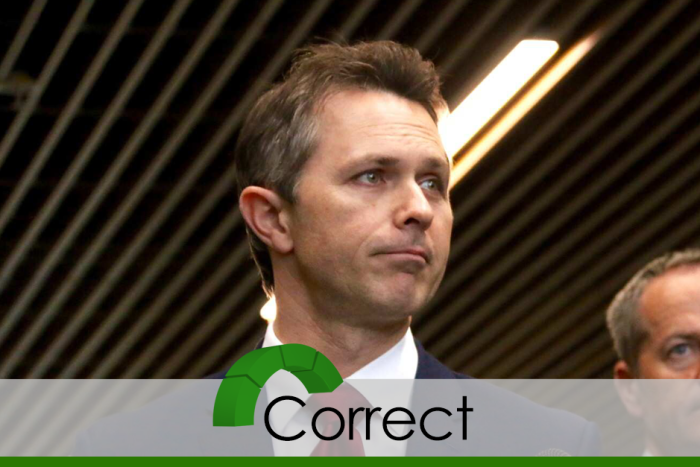Fact check: Has Australia's internet speed dropped from 30th to 60th in the world under the Coalition?
Updated
 Photo:
Opposition communications spokesman Jason Clare says that Australia's internet connection speeds have dropped from 30th in the world to 60th under the Coalition. (ABC: Nick Haggarty)
Photo:
Opposition communications spokesman Jason Clare says that Australia's internet connection speeds have dropped from 30th in the world to 60th under the Coalition. (ABC: Nick Haggarty)
The claim
"[The Coalition] have had almost three years on this... Over that time we have gone from 30th in the world for internet speeds to 60th in the world for internet speeds," Opposition communications spokesman Jason Clare told ABC's RN Breakfast on June 13, 2016.
Has Australia's global rank for internet speeds fallen from 30th to 60th under the Coalition? ABC Fact Check investigates.
The verdict
Mr Clare is correct.
Experts contacted by Fact Check said reports relied on by Mr Clare, published by content delivery network provider Akamai, are highly regarded and accepted by the industry.
The reports show Australia's average peak connection speed of 30.1 megabits per second ranked 30th in the world in the quarter ending in September 2013, the month the Coalition took office.
The most recent report available at the time the claim was made shows Australia's average peak connection speed of 39.3 mbps ranked 60th in the world in the quarter ending in December 2015.
Experts consulted by Fact Check said the Coalition contributed to Australia's drop in rankings for several reasons, including its policy of rolling out fibre to the node technology rather than fibre to the premises.
The source of the claim
A spokesman for Mr Clare referred Fact Check via email to Labor's broadband policy document, which says: "In the last three years Australia has plummeted from 30th in the world for internet speeds to 60th."
The policy document, and Mr Clare's spokesman, referred to quarterly State of the Internet reports published by Akamai, a content delivery network provider, as the basis of the claim.
Mark Gregory, a senior lecturer in the School of Engineering at RMIT University, said Akamai has "over a period of many years now become a reasonable indicator of what's happening in the world because Akamai runs one of the largest content delivery networks".
He said Akamai has systems all around the world that provide content such as advertisements, graphics and logos.
"They run this international content delivery network ... What they are able to do, based on this content delivery, is look at the connection speeds, and the upload and download speeds and so forth, based on the time it takes for traffic to go from their servers to peoples' browsers."
Dr Gregory said the industry accepts Akamai's figures and "there has not been, to my knowledge, anyone strongly opposing or questioning the figures".
Rod Tucker, an emeritus professor of electrical engineering at the University of Melbourne, said Akamai is now the only source of data on global rankings for internet speeds and is "highly regarded".
Priyadarsi Nanda, a senior lecturer in the School of Computing and Communications at the University of Technology Sydney, had a similar view, telling Fact Check Akamai "is a good source for research".
Average or peak connection speed?
David Belson, editor of Akamai's State of the Internet report, referred Fact Check to a post he wrote on the company's blog explaining the measurements published in the report.
He wrote that the measurements are taken from between 100 to 200 trillion content requests from more than 200 countries and regions around the world during a given quarter.
The State of the Internet report refers to the "average connection speed" and the "average peak connection speed" in each country.
In his blog post, Mr Belson wrote that the "average connection speed" for a country is calculated by taking an average of all of the connection speeds calculated during the quarter from each unique IP address in that country.
Emeritus Professor Tucker told Fact Check: "A unique IP address is the individual internet address of each home and business connected to the internet."
Mr Belson explained the "average peak connection speed" is calculated by taking an average of only the highest connection speed calculated from each unique IP address in the country.
He wrote: "We believe that the average peak connection speed is more representative of internet connection capacity. By using the fastest measurement observed from each unique IP address, we are capturing only those connections that reached maximum throughput rates."
He told Fact Check: "In addition, as the post notes, there are a number of factors that can impact the measured average connection speed."
The post explains that, for example, a browser can make so-called "parallel requests" to Akamai for pieces of content, such as the base HTML page, a shared JavaScript, a CSS file, embedded images, or one or more advertisements, each of which Akamai logs individually.
"Given that these requests are all competing for a limited resource (the bandwidth of the internet connection), each of these requests receives just a fraction of the overall resource, ultimately lowering the observed speed associated with each request," it says.
Emeritus Professor Tucker said: "The best measure, the way [Akamai] do their measurements, of download speed is actually the average peak download speed or connection speed. It's widely recognised that that's the appropriate number to use."
Dr Gregory agreed that the average peak connection speed should be used, adding that Akamai's blog "clearly provides that information".
Dr Nanda also advised using the average peak connection speed, which indicates "what the ideal speed should be" in a given country and time period.
The data
Akamai provided Fact Check with data on Australia's average peak connection speed in each quarter since the beginning of 2013, as well as Australia's global ranking for average peak connection speed over the same time period.
Fact Check has graphed the data below.
The most recent figures show Australia's average peak connection speed of 39.3 megabits per second ranked 60th in the world in the quarter ending in December 2015.
Former prime minister Tony Abbott was sworn in late in the quarter ending in September 2013.
The figures indicate Australia's average peak connection speed of 30.1 mbps in this quarter ranked 30th in the world.
In the following quarter - the Coalition's first full quarter in office - Australia's average peak connection speed reached 35.2 mbps, ranking 32nd in the world.
Mr Belson told Fact Check that Akamai's report for the three months to March 2016, due to be published on June 29, will show that Australia's ranking has improved from 60th to 56th.
Fact Check assesses claims based on information available at the time a claim is made, and so has not taken this into account in assessing Mr Clare's claim.
What the experts say
Mr Belson told Fact Check: "While it is true that Australia's position in our global rankings has fallen over the last three years, that doesn't tell the whole story. At the same time... the average peak connection speed has increased by over 17 mbps — up 67 per cent [from the beginning of 2013 to March 2016]. This is solid growth over time."
Emeritus Professor Tucker said the figures show internet speeds elsewhere in the world, "in fact the average speed around the world", have increased faster than in Australia.
"In other countries, including emerging economies, the speeds are growing much more rapidly than Australia and that's why our ranking is going down. Even though we are increasing speed, it's not increasing as fast as it is elsewhere," he said.
"Internet users in other countries are getting access to and using very high speed broadband services more quickly than users in Australia."
He said the Coalition Government can be blamed for Australia slipping down the global rankings.
"The drop in the rankings is partially due to the delays in the NBN broadband rollout while NBN Co negotiated new contracts with Telstra and Optus. The slide in rankings will probably continue into the future because the Coalition is now rolling out relatively slow FTTN (fibre to the node) rather than faster FTTP (fibre to the premises)."
Dr Gregory said: "Since 2010, other countries have been more proactive in rolling out high speed access networks with lower charges for the high speed tiers and this has resulted in Australia falling from 30 to 60 over the past three years."
The Coalition "has done nothing to reverse the trend and have taken action that will make the problem worse in coming years," he said.
"The Coalition's decision to change the rollout to inferior technologies (FTTN), the associated 12-month delay whilst agreements were re-negotiated and a failure to address the underlying over-charging by the telecommunications industry has exacerbated the matter and in my view enhanced the rate of Australia's fall down the ranking," he said.
"Now that customers realise that they may not get close to 100/40 mbps (100 mbps download speed and 40 upload) if they pay for this speed tier, for example, many customers have opted for a lower speed tier anticipating they will get what they pay for. Another issue is that some retail service providers have decided to not offer the 50/10 mbps speed tier, preferring instead to offer customers 'up to' 25/5 mbps or 'up to' 100/40 mbps."
He said the issue was cyclical.
"If customers do not connect at higher speed tiers, they pay less, which means NBN Co gets less revenue and this results in a slowing of the decrease in ... charges. Australia falls further behind and faster."
Dr Nanda said a lot of factors have influenced Australia's drop from 30th in the world to 60th, and rolling out fibre to the node technology is "definitely" one of them.
He said "you have to communicate between A to B" during an internet connection, and "definitely you can reach A to B faster" through fibre to the premises, rather than "A to B going through X" through fibre to the node.
He said copper technology, rolled out under the Coalition, is also holding Australia's internet speeds back.
"Everybody knows that copper technology has got certain limitations in spite of all the new improvements, which have happened in the last decade or so, but it cannot be compared to fibre optics."
Sources
- Jason Clare, ABC RN Breakfast, June 13, 2016
- Labor's plan to build the national broadband network Australia needs for the jobs of the future, 2016
- David Belson, State of the Internet metrics: What do they mean? February 5, 2015
- Tony Abbott, Remarks at swearing-in of first Abbott government, September 18, 2013
Topics: alp, government-and-politics, information-and-communication, internet-technology, australia
First posted













